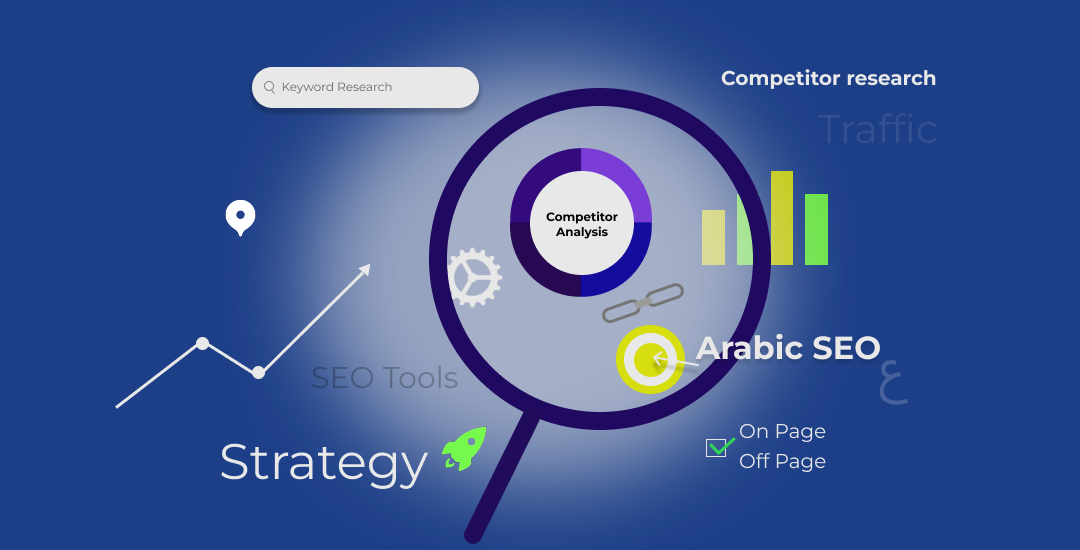So if you want to target the Arabic-speaking markets, knowing how to do SEO for Arabic websites isn’t a luxury it’s a necesity. The digital realm is getting crowded in countries like UAE, Saudi Arabia and Egypt. To keep up, you need to know what your rivals are doing and do it better. competitor analysis in Arabic SEO is what will give your effort that kind of shout.
If you are working with an Arabic SEO agency or an individual Arabic SEO consultant in Dubai, it is useful to have a good understanding of how to do competitive research, so you can ensure you have an accurate and efficient keyword strategy.
Here’s how to do it, broken down into concrete steps.
1. Identify Your Arabic SEO Competitors
Your Competition May Not Be Your Competition Your SEO competition isn’t necessarily the competition in business. Yes, your dukkha brand may square off against Company A in terms of product innovation, but you may well be in a rolling street fight with Company B for the audibility of the Arabic word for “plumber” on Google.
To begin:
- Check your main keywords in Arabic on incognito mode (e.g.: “خدمات التسويق الرقمي في دبي”).
- Look at the top ranking websites These are your true SEO competitors.
- Leverage tools such as Ahrefs, SEMrush, or Ubersuggest to extract insights into their organic traffic, best-performing pages, and keyword rankings.
Be sure to target companies using SEO in Arabic, and not just English. For the Arabic markets, content strategy is a whole different ball game, because of the variations in language, culture and search patterns.
2. Analyze Arabic Keywords for SEO
Arabic language is one of the most intricate and complex languages. The keyword intent may also change greatly in genres or even in regions and dialects. And that is why SEO keywords in Arabic should be approached with a targeted strategy.
Here’s how to analyze them:
- Check your competitors’ meta titles and headers and blog titles in Arabic.
- Leverage tools such as Google Keyword Planner or Keyword Tool. io with Arabic language filter on.
- Concentrate on SEO Arabic language keywords they can generate volume of traffic high yet are as well relevant to your services.
You should also look for long-tail keywords such as “أفضل وكالة سيو عربية في دبي” (best Arabic SEO agency in Dubai) or “استراتيجيات السيو المحلي للمواقع العربية” (local SEO strategies for Arabic websites) these will generally generate leads that have a higher chance of converting.
3. Study Their Content Strategy and On-Page SEO
Check out your top-ranked competition and read through their:
- Blog topics and update frequency
- Content length and formatting
- Internal linking and media (images, videos, infographics)}`}
- How they are writing SEO titles & descriptions in Arabic
- If they are using correct Arabic script (grammar, punctuation, spacing).
Good SEO optimization for Arabic content isn’t just translation; it also comes down to culturally appealing, well-structured content. See if they are adding value or if they’re just keyword stuffing. Use this knowledge to develop your own content that is clear and purposeful.
4. Investigate Backlink Profiles
Quality backlinks still matter when it comes to middle east seo. If you want to learn how your competitors earn those authority links, check out where they get their backlinks from.
With tools such as Ahrefs or Moz:
- Find the Arabic sites that are referring to your competition.
- Sort by domain authority and relevance.
- Try patterns guest posts, business listings, local directories, media mentions.
Get in touch with peers with similar content for partnership opportunities. A single well-placed backlink from an Arabic news site or blog with authority can push your SEO influence to the next level.
5. Evaluate Technical SEO and Local Presence
Technical performance: the silent factor of SEO that is often overlooked. Check your competitor’s website for:
- Mobile friendly (crucial in the MENA region especially )
- Website speed (with GTmetrix or Page Speed Insights)
- Arabic URL structure and hreflang tag implementation
And don’t neglect Local SEO strategies, either. Check if your competitors make good use of Google My Business or have Arabian reviews or embed local search keywords like “خدمات السيو في دبي” (How To Get Translation Requests). A local footprint shows search engines and customers that you are relevant to.
6. Monitor and Adjust Competitor SEO Activity
SEO isn’t a one-time job. What your competitors are doing is always in flux, particularly in the fast-growing digital markets. Monthly or quarterly: Pronounce Know when to schedule Create a structured review process to:
- Keep an eye on new keywords that competitors are ranking for
- Spot new backlink sources
- Analyze changes in the content or the gameplan
Just ensure that you work with an Arabic SEO consultant that is aware of this or if you’re business is large enough, invest in a specialized Arabic SEO agency in Dubai and have them follow market movements to not be left behind.
Conclusion
A clever competitor analysis can make the difference between your Arabic SEO simply being average to exceptional. By learning from what works for others and identifying missed opportunities you set your business up for long term visibility and success in Arabic-speaking markets.
And, whether you plan on doing it yourself in-house, or through an experienced Arabic SEO consultant, you can use these 51 insights to help form a well-defined localized SEO strategy. If you’re looking for a proven Arabic SEO agency in Dubai, look for one that understands the need for numbers and cultural accuracy.
WiseTech Systems LLC is your go to partner for SEO services, let your business lead in the digital Middle East.



